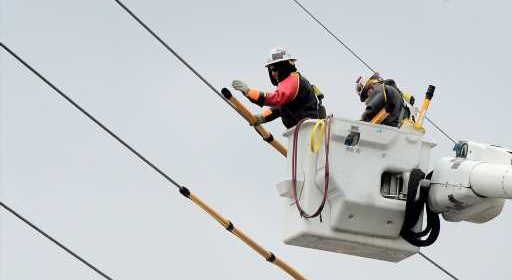Nearly a fourth of Colorado households are behind on their power bills, study estimates

About one in four Colorado households are behind on their power bills, similar to the rate before the pandemic, but how much they owe has risen significantly, according to a new study Thursday from Arcadia, a firm that connects utility customers with community solar and wind power sources.
Measuring the depth of the hole the pandemic has put consumers in when it comes to utility bills isn’t an easy calculation. Arcadia took a stab at it, diving into two year’s worth of statements of 120,000 members in the District of Columbia and 13 states. The analysis included 3,925 households in Colorado who closely matched the state’s overall population in age, income and homeownership rates.
“Perhaps surprisingly, the data doesn’t show that more households owe money on their electric bills. The rate of past-due balances held steady at 26% of bills analyzed in 2018, 2019, and 2020,” said Owen Quinlan, vice president of analytics and data science at Arcadia in a blog post. In Colorado, the share of customers overdue ran at 23%.
What came as a surprise was just how much the deficits shot up, Quinlan said. Across the statements surveyed, the average shortfalls rose from $509.81 in 2019 to $660.12 in 2020 and then surged to $849.46 in January 2021.
In Colorado, which has lower electricity costs than many other states, it went from $388.91 in 2019 to $541.07 in 2020 and $586.61 in January. Extrapolating that out, Arcadia estimates Colorado households owe $300 million in back electricity payments as of January, which is $101.1 million more than what they were behind before the pandemic.
“The same group of people is carrying past-due balances that just keep getting larger,” Quinlan said.
One reason for that is more people are working and schooling from home, boosting consumption of electricity and natural gas. Income also became less certain with reduced hours, furloughs and layoffs common.
Denise Stepto, a spokeswoman for Energy Outreach Colorado, said the pandemic forced more households to juggle priorities, whether it was paying the rent, buying food, purchasing medications, or covering utility bills. A state executive order prevented utilities from cutting off nonpaying customers through September, allowing other items to take priority.
“Many people, unfortunately, let this bill pile up and then had a tremendous problem when the moratorium was lifted and the bill came due. We helped many get caught up and worked with utility companies to get households on affordable payment plans. But with money being tight — this problem persists,” Stepto said.
Energy Outreach Colorado received more than 250,000 requests for help under its Bill Payment Assistance program since the pandemic started, Stepto said. Of that total, the nonprofit helped more than 25,000 customers cover overdue bills via $13 million in assistance, with the amount covered averaging in the $400 to $500 range, she said.
Xcel Energy serves about 60% of electric and natural gas customers in Colorado, making it the state’s largest utility. At the end of February, about 24% of its residential customers were behind with the average shortfall at $331, said spokeswoman Michelle Aguayo.
Less than 17% of its commercial and industrial customers were behind, with their average balance past due at $1,500.
“Since the start of the pandemic we’ve encouraged customers to contact us to set up payment plans and have worked with customers to establish more and longer payment arrangements than we’ve typically managed in the past,” Aguayo said.
Those payment plans head off disconnections. Aguayo urged customers who are struggling to pay their bills to contact the company’s customer care line at 800-895-4999 to make payment arrangements.
Utility customers who have received a disconnection notice and meet income qualifications can also call Energy Outreach Colorado for help at 866-432-8435.
Source: Read Full Article
